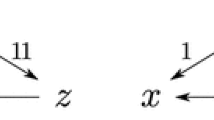Abstract
This paper provides a distance based analysis of the Borda rule with respect to Condorcet’s criterion. It shows that the minimal Condorcet consistency present in the Borda rule, whenever a Condorcet winner (the alternative that wins against every other alternative in a pairwise contest) exists, disappears in the case of voting cycles. First, it is shown that for certain preference profiles the Borda winner is furthest from being a Condorcet winner. Second, it is shown that there exist preference profiles for which the Borda winner is closest from being a Condorcet loser (the alternative that loses against every other alternative in a pairwise contest).
Similar content being viewed by others
References
Baigent, N. (1983), Some Reservation on Strictly Majoritarian Social Choice, Discussion Paper Series, University of Essex.
B. Debord (1987) ArticleTitleCaractérisation des matrices de préférences nettes et méthodes d’agrégation associées Mathématiques et Sciences Humaines 97 5–17
Dodgson, C. (1876), A method of taking votes on more than two issues, in Black, D. (1958), The Theory of Committees and Elections, London: Cambridge University Press.
P. Fishburn (1977) ArticleTitleCondorcet social choice functions SIAM Journal of Applied Mathematics 33 469–489 Occurrence Handle10.1137/0133030
J. Kemeny (1959) ArticleTitleMathematics without numbers Daedalus 88 577–591
C. Klamler (2004) ArticleTitleThe Dodgson ranking and its relation to Kemeny’s method and Slater’s rule Social Choice and Welfare 23 91–102 Occurrence Handle10.1007/s00355-003-0238-6
C. Klamler (2003) ArticleTitleA comparison of the Dodgson method and the Copeland rule Economics Bulletin 4 IssueID8 1–7
G. Laffond J. F. Laslier M. Breton ParticleLe (1994) ArticleTitleThe Copeland measure of Condorcet choice functions Discrete Applied Mathematics 55 273–279 Occurrence Handle10.1016/0166-218X(94)90013-2
M. Breton ParticleLe M. Truchon (1997) ArticleTitleA Borda measure for social choice functions Mathematical Social Sciences 34 249–272
McLean, I. and Hewitt, F. (eds.) (1994), Condorcet: Foundations of Social Choice and Political Theory, Edward Elgar.
H. Moulin (1988) Axioms of Cooperative Decision Making Cambridge University Press New York
H. Nurmi (1999) Voting Paradoxes and How to Deal with Them Springer-Verlag Heidelberg
T. C. Ratliff (2001) ArticleTitleA comparison of Dodgson’s method and Kemeny’s rule Social Choice and Welfare 18 79–90 Occurrence Handle10.1007/s003550000060
T. C. Ratliff (2002) ArticleTitleA comparison of Dodgson’s method and the Borda count Economic Theory 20 357–372 Occurrence Handle10.1007/s001990100218
D. G. Saari (1995) Basic Geometry of Voting Springer-Verlag Berlin
D. G. Saari (2000a) ArticleTitleMathematical structure of voting Paradoxes. I. Pairwise Votes Economic Theory 15 1–53 Occurrence Handle10.1007/s001990050001
D. G. Saari (2000b) ArticleTitleMathematical structure of voting Paradoxes. II. Positional Voting Economic Theory 15 55–102 Occurrence Handle10.1007/s001990050001
H. P. Young (1974) ArticleTitleAn axiomatisation of Borda’s rule Journal of Economic Theory 9 43–52 Occurrence Handle10.1016/0022-0531(74)90073-8
H. P. Young (1988) ArticleTitleCondorcet’s theory of voting American Political Science Review 82 1231–1244
H. P. Young (1995) ArticleTitleOptimal voting rules Journal of Economic Perspectives 9 51–64
Author information
Authors and Affiliations
Corresponding author
Rights and permissions
About this article
Cite this article
Klamler, C. Borda and Condorcet: Some Distance Results. Theor Decis 59, 97–109 (2005). https://doi.org/10.1007/s11238-005-5459-y
Issue Date:
DOI: https://doi.org/10.1007/s11238-005-5459-y




